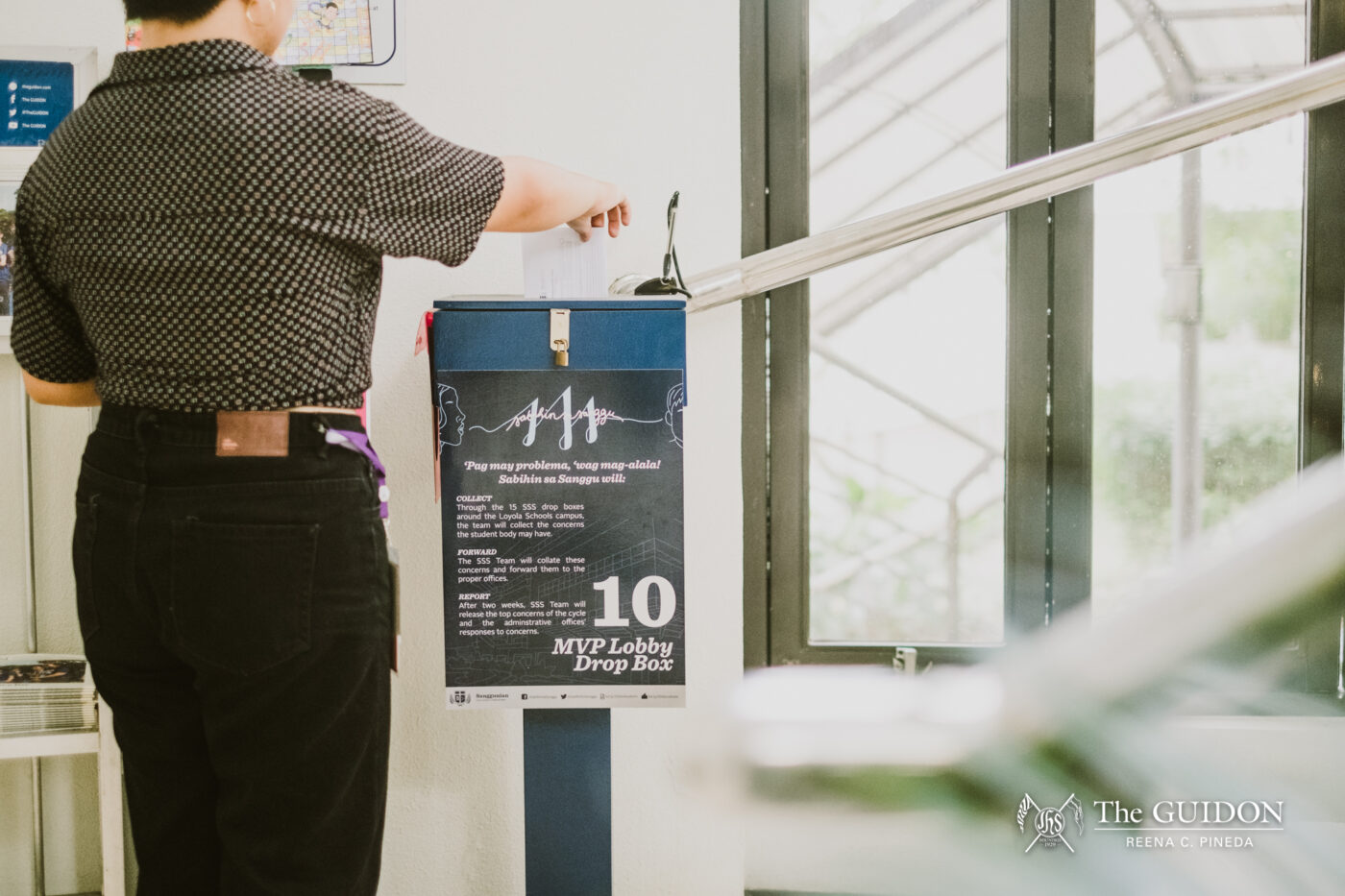THE “SABIHIN Sa Sanggu” (SSS) initiative showcased its findings for the top student concerns for the month of October on November 25, and the months of November and December on December 30 via its Facebook page. These exposed concerns in the Loyola Schools’ (LS) facilities, technologies, and school regulations.
As mentioned in a memo by Sanggunian on September 27, SSS is a “convenient platform through which students may conscientiously and responsibly voice out their concerns.”
In October, the main concerns shed light on the OBF Wi-Fi and ARSAnet, parking areas, classroom ventilation, the Ateneo website and the Ateneo Integrated Student Information System (AISIS), shower rooms, hazardous locations such as the loose bricks in the Red Brick Road, heavy academic workload, number of school days, and the priceyness of using Adobe programs for the course Bachelor of Fine Arts in Information Design.
In November and December, the concerns centered on the Wi-Fi services, restrooms, mosquito control, e-jeeps, guidance testing, study spaces, Matteo Ricci Hall’s night operation, microfilm printing, curricula on AISIS, and trash bins.
According to Sanggunian Department of Administrative Affairs head Jb Bejarin, who oversees SSS, students have been actively sending in their concerns. However, Bejarin noted that the responses decreased from its launch. In October, 150 responses were solicited, while 17 and 20 concerns were raised in November and December, respectively.
Bridging the gap
As stated by Bejarin, SSS was created due to the lack of student participation in school matters. Students, according to him, opt to voice out their concerns on informal platforms like Twitter or the ADMU Freedom Wall rather than come forward to the administration.
“People wanted to participate, but they didn’t know how,” Bejarin said.
The idea of SSS was taken from “Boses,” a similar initiative carried out last school year in the Ateneo Senior High School (ASHS), where Bejarin was former Sanggunian president. While he considered it to be effective, he noted that the implementation in ASHS was easier and more centered than in college, where there is a larger number of students.
He said that this is why SSS uses “collection cycles,” where answered forms, both online and in paper would be collected every two weeks before concerns are summarized and forwarded to respective offices such as the Office for Student Services (OSS), Office of Guidance and Counseling (LSOGC), Office of Health Services (OHS), and the Ateneo Residence Halls (RH). The Sanggunian also sends copies to the Vice President for the Loyola Schools (VPLS).
Bejarin acknowledged the difficulties in garnering responses from the Ateneo administration, as “not all offices have flexible schedules.” Instead of “forcing” the offices to respond immediately or by a certain date, the Sanggunian opted to allow offices to choose when to respond.
Student response
Some students considered SSS to be effective in terms of its ways in bringing students to voice their concerns.
Communication freshman Sam Aviles said that “[SSS] bridges the gap between the students, the Sanggunian, and the administration.”
Meanwhile, computer science senior Oey Mirabueno (4 BS CS) echoed the same sentiments, saying that SSS is “a tangible representation that the Sanggunian is open to hearing and receiving concerns from the student body.” For him, it allows students to “not only support SSS, but Sanggu as well.”
For interdisciplinary studies junior Paolo Carlos, “[SSS] allows an official outlet for students to share their concerns or problems that they may have with regards to the campus.”
Moreover, some students also mentioned that the SSS would do better by maximizing its online platform. While the SSS does have online submissions, Aviles said that most people are only aware of the traditional dropboxes. Joel Lim (5 AB IS) also asserted that the SSS would be more sustainable online, saying “pen and paper can only do you so much.”
A work in progress
So far, Bejarin considered SSS to be sustainable despite the need for several adjustments.
“There will always be problems that students could raise to the offices, and there could always be a way that [Ateneo] can innovate things in LS,” he said.
Bejarin also noted the importance of trust amongst the community in the sustainability of SSS, which includes Sanggu’s efficiency, the students’ willingness to participate, and the administration’s treatment of the issues in gathered from the initiative.
Bejarin said that efforts to improve its logistical process and promotions are being considered for increased student participation through the manual distribution of forms.
He also explained that Sanggu’s main goal for now is to standardize the SSS so they could have it utilized in the future.
Possible solutions for the students, by the students
Furthermore, Bejarin considers the SSS as an expression of solidarity on campus, as “SSS is a testament of how community spirit can be shown,” Bejarin stated.
He said that when students submit their forms to the SSS, their responses are treated as concerns rather than complaints. Bejarin noted that some students actually go beyond placing their comments but also give suggestions to the problems.
He added that this may actually be a way of innovating the SSS, as having students suggest solutions would be “of value to the offices.”
Bejarin then called the Ateneo community to participate in SSS, for aside from realizing that they are not alone in their concerns, students can go beyond caring for their concerns but “seek action for the good of the community”.
“There’s a big chance that you’re speaking for someone who can’t speak or didn’t have time to spend five minutes to write the concern,” he stated.







